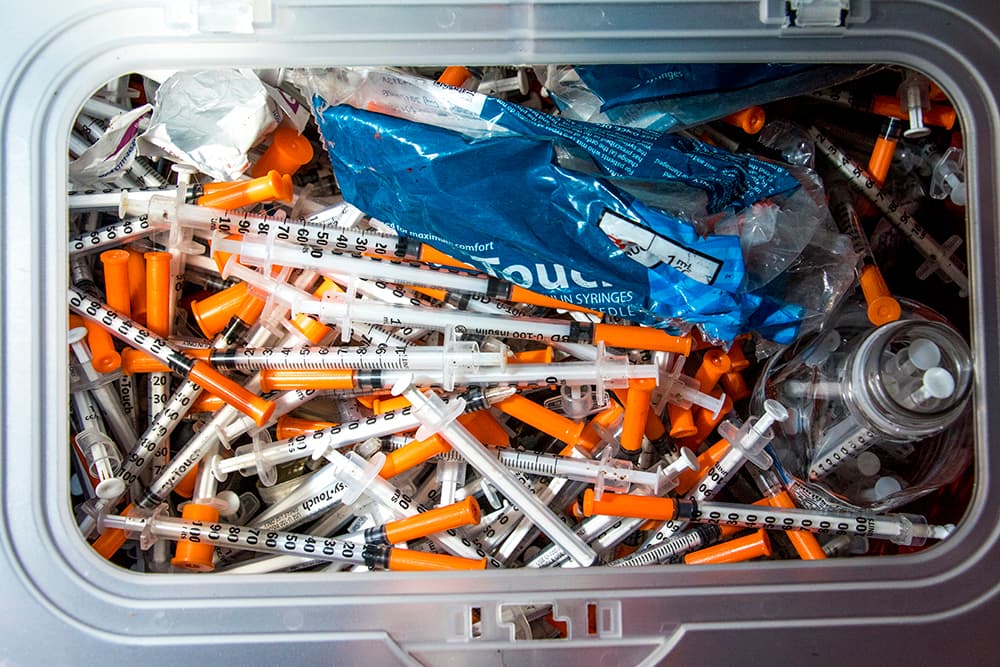In potholed alleys, in coffee shop bathrooms and under bridges around the city, people are dying from drug overdoses.
A law being proposed by Councilman Albus Brooks would legalize supervised injection centers, where people addicted to opioids could use the drugs en route to recovery -- or at least in a safer environment that deters fatal overdoses and the spread of chronic diseases like hepatitis C and HIV.
It's a policy created in response to an epidemic of heroin, fentanyl, methamphetamine and other drugs that killed 201 people in Denver in 2017 and 64,000 across the country in 2016. A big reason for those deaths is a dearth of immediate health interventions, says Lisa Raville, who heads Denver's Harm Reduction Action Center in Capitol Hill.
"This is a bridge between life and death," Raville said in an interview. "Right now we know that people are dying of preventable overdoses... If those are intervened in time, people can be alive. I can't get people into treatment if they're not alive."
Raville sees between 120 and 150 people every morning for clean needles and drug testing, and to connect people to other health services. Users need immediate detox services that aren't always available, or they must inject or use the drugs to combat withdrawal -- and they do that in public. Sometimes they overdose and die there.
"They're going to use today, even if I can't get them in tomorrow," Raville said.
That's why Reville can tick off the names of 18 people who recently died from overdosing in public.
Denver needs the go ahead from the state, but maybe not the feds.
The city ordinance, which would legalize a pilot drug center, would have to make it out of the Safety, Housing, Education and Homelessness Committee next week and then gain approval of the full council with a legislative vote. Mayor Michael Hancock would have to sign the bill into law.
The Hancock administration released its Opioid Response Strategic Plan earlier this year, which aims to "reduce barriers to safe use sites" and "implement innovative service facilities that are open and welcoming to people who use drugs."
The site contained in the law that Brooks is proposing fits that bill exactly, he said. He visited a safe use center in Vancouver as part of his research for the ordinance and is convinced it's the right way forward.
"In our plan it talks about treatment, but there's all these barriers to treatment," Brooks said."We believe that we are removing the barriers that are in place. I fear as we've had hundreds of meetings... that folks don't realize how dire the situation is."
Even if Denver elected officials pass a law, legalization would only get triggered if the Colorado legislature passes a law in 2019 that changes rules about drug possession and use. Brooks said state Rep. Leslie Herod would sponsor a bill that clears the way for the site.
Attorney General Cynthia Coffman supports the proposed ordinance, too, according to one of her appointees, Jose Escovel, who testified Wednesday.
"She is well aware that the opioid crisis is going to get worse before it gets better and that bending the arc of this public health crisis is going to take multiple strategies," Escovel said. "And those strategies will be implemented at the local level."
Then there's the question of whether the federal government will go after Denver, the state or the injection site itself. Possession of heroin and other narcotics is obviously illegal. But there's no federal law that authorizes or bans safe use sites, according to Kristen Crawford, Denver's legal counsel.
Meanwhile, the Trump administration declared an official public health emergency last year because of opioids. Colorado has the right to regulate public health, Crawford said.
The breadth of the crisis should make the site apolitical, according to Raville.
"This epidemic is bipartisan," she said.












